September 2010 - Vol. 42
Courage
Forged Under Fire
edited by Don Schwager What motivated a 21-year-old university student in Munich to risk her life by publicly speaking against a dictator bent on murdering six million Jews? Sophie Scholl was a shy and polite middle-class woman who had learned easily and lived a carefree childhood. She was brought up in a Lutheran family, fourth of six children. Sophie's father, Robert Scholl, was the mayor of Forchtenberg, Germany, when she was born in 1921. Her mother was a devout Christian and Lutheran preacher who encouraged her children to read the Bible. Growing opposition
to discrimination and injustice
“How could [Hitler] not know? [the camps have] existed for years and were set up by his friends. And why didn’t he use his power to do away with [the camps] at once? Why are those who are released from them forbidden on pain of death to tell anything about what they went through?” She refused to sit still and just let happen what she considered grave wrongs. Her father’s strong opposition to Hitler and the arrest of her brothers and friends in 1937 for participating in a German youth group prohibited by the Nazi government left a strong impression on her. Her firm Christian belief in God and in the dignity of every human as created in God’s image formed her basis for resisting Nazi ideology. 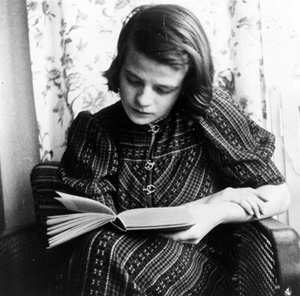 Sophie’s circle
of friends
In May 1942 she enrolled at the University of Munich as a student of biology and philosophy. Her brother Hans was studying medicine there. He introduced her to his friends who had a mutual interest in art, music, literature, philosophy, and theology. During their breaks from studies, they enjoyed spending time together hiking in the mountains, skiing and swimming. They also attended concerts, plays, and lectures together. They were soon to take a political stand based on religious convictions, a stand which would change the course of their lives. The rights and
duties of conscience
Professor Carl Muth, an elderly Catholic scholar, and his scholar friend, Theodor Haecker, a writer and translator who supported the German resistance movement, were important philosophical influences on Sophie’s moral, intellectual and spiritual journey towards active opposition. Haecker introduced Sophie and her friends to the works of John Henry Newman, which he had translated into German. Newman taught that conscience was an echo of the voice of God enlightening each person to moral truth in concrete situations. Christians, he argued, had a duty to obey a good conscience over and above all other considerations. Haecker had also introduced Newman’s writings to Joseph Ratzinger (now Pope Benedict XVI), who would become a great admirer of Newman and his "theology of conscience." Sophie gave two volumes of Newman's sermons to her boyfriend, Fritz Hartnagel, a German army officer, when he was deployed to the eastern front in May 1942. On arriving in the town of Mariupol, Russia, Hartnagel saw corpses of Soviet soldiers who had been shot by their German guards and began to hear reports of mass killings of local Jews. He later wrote to Sophie to say that reading Newman's words in such an awful place were like tasting “drops of precious wine.” “What a fallacy it is to take nature as our model for our actions and to describe its cruelty as ‘great,’” he said in a letter of July 1942. “But we know by whom we were created and that we stand in a relationship of moral obligation to our creator. Conscience gives us the capacity to distinguish between good and evil,” quoting verbatim from a sermon given by Newman called “The Testimony of Conscience.”
The White Rose
resistance movement
Like many other students, they were critical of Hitler’s regime and the war, but the kind of non-violent resistance activity they embarked upon ran contrary to their middle class upbringing. With Professor Kurt Huber, they later began to surreptitiously compose and distribute anti-government leaflets telling German Christians that they had a moral duty to rise up against Hitler, the “messenger of Anti-Christ.”
Some of the medical students who were members of the White Rose resistance group were sent to the frontlines and witnessed firsthand the horrific carnage. They also heard from friends about mass murders in Poland and Russia. With the limited means at their disposal, they decided to take action. In June 1942, they wrote, duplicated, and distributed four “Leaflets of the White Rose.” These was followed by “Leaflets of the Resistance Movement in Germany,” and several similar compositions. Thousands of leaflets were duplicated and mailed to names taken at random from the telephone directory. To maintain secrecy, they purchased envelopes, duplicator ink, and paper in small quantities at many shops, and travelled to a variety of cities to mail the letters, to give the appearance that the movement was widespread and to shield the Munich University. The German people were shaken by their first defeat and major loss of life at the Battle of Stalingrad in 1943, and the White Rose group saw this as the opportune time to step up their activities. Hans Scholl, Schmorrell, and Graf began to scrawl “Down with Hitler” slogans in coal tar on various buildings in Munich during the night. The group steadily became bolder. In early 1943, just days before Sophie was arrested, she told a friend that “so many people are dying for this regime it is high time that someone died opposing it.” Early in the morning on February 18, Hans and Sophie left bundles of leaflets outside lecture room doors at the university. Sophie then tossed a bundle over the university balcony to flutter down to the atrium below. This act is now commemorated in a memorial relief sculpture which depicts scattered “leaflets” in ceramic mounted among the flagstones. Sophie and Hans were spotted by the janitor Jakob Schmid. They were hauled before the dean, Dr Haeffner, and arrest quickly followed.
Interrogation,
trial, and execution
On February 22 Hans, Sophie, and their friend Christoph Probst, were tried by a ranting, screaming judge, Roland Freisler. He had the reputation as the most terrifying judge in Nazi Germany. He was President of the People’s Court, where he gave the death sentence to 1,192 people in his first year in office. He was Hitler’s special man to handle cases in the court of people who would defy Hitler as Fuhrer and defy the war efforts. Freisler’s trials were extremely quick and demeaning. After less than four hours of trial, the accused were condemned to death. The judge, according to custom, gave the defendants the last words. Hans’ last words in the court were, “Today you will hang us, but soon you will be standing where I now stand.” Sophie stated, “What we wrote and said is believed by many others. They just don’t dare to express themselves as we did… You know the war is lost. Why don’t you have the courage to face it?” As they were assisted out of the court, their parents and brother managed to force their way into the non-public proceedings. Their father shouted, “There is a higher court before which we must all stand.” Their mother nearly fainted as she received the announcement about her children’s death sentence. When their parents were able to visit their children in the visiting room, the mother exclaimed to her daughter, “Remember Jesus.” Sophie replied, “Yes. But you [remember him] too.” Those were her last words to her parents. As they were sitting in their separate cells, they were visited by the prison chaplain. He encouraged Sophie to read from the bible, and the first passage she read to him was from 1 Corinthians 13:8-13: Love never fails. But whether there are prophecies, they will fail; whether there are tongues, they will cease; whether there is knowledge, it will vanish away. For we know in part and we prophesy in part. But when that which is perfect has come, then that which is in part will be done away. When I was a child, I spoke as a child, I understood as a child, I thought as a child; but when I became a man, I put away childish things. For now we see in a mirror, dimly, but then face to face. Now I know in part, but then I shall know just as I also am known. And now abide faith, hope, love, these three; but the greatest of these is love.The last words that were read before she entered the anteroom to the execution were, “Greater love has no one than this, than to lay down your life for your friends” (John 15:13). The execution took place by guillotine in the convict prison Munich-Stadelheim only a few hours after the trial, and was supervised by Dr. Walter Roemer, the enforcement chief of the Munich district court at that time. The last words that Hans shouted before the blade fell were, “Long live
freedom!”
Further arrests
and executions
Sophie and her friends had fought against Hitler’s tyrrany, not with bullets and bombs, but with words, printed in leaflets, that proclaimed a passionate desire to live in a free and democratic society according to one’s religious convictions. Her brave and principled stand made her a legend in Germany. There are over 190 schools in Germany named in Sophie Scholl’s honor
including the schools she herself had attended. These schools have as their
motto, “We stand up against injustice.” In 1999 Sophie Scholl was
voted “Woman of the Century” in a nationwide poll conducted by a leading
women’s magazine. In 2005 the German film “Sophie Scholl: The Final Days”
was nominated for “Best Foreign Film” at the Academy Awards. In that same
year Sophie and her brother Hans came in 4th in another nationwide poll
of “Germany’s Greatest,” a last example of standing up for what is right
even at the risk of one’s own life.
|
. | ||||||
|
publishing address: Park Royal Business Centre, 9-17 Park Royal Road, Suite 108, London NW10 7LQ, United Kingdom email: living.bulwark@yahoo.com |
. |
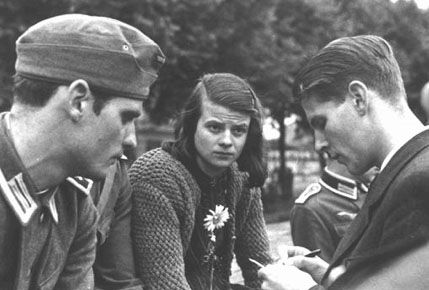
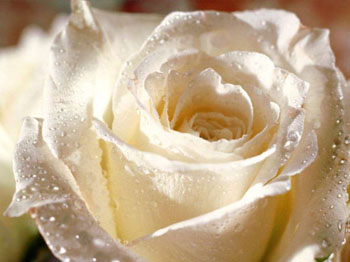
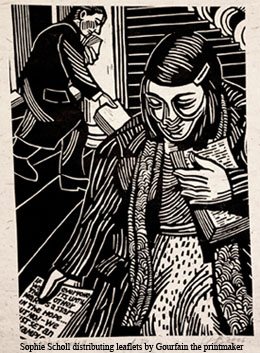 They
had to work secretly because their activities constituted treason and were
punishable by death. Hans Scholl and Willi Graf had already been taken
into Gestapo custody once in 1937 for membership in a prohibited youth
group. The Dean of Munich University wore a Nazi uniform and the Hitler
Youth Movement had a strong presence within the student body. The university
ideal of freedom and learning was subverted to such an extent that many
students and staff participated in the burning of books, and the university
library displayed a sign forbidding entry to Jews.
They
had to work secretly because their activities constituted treason and were
punishable by death. Hans Scholl and Willi Graf had already been taken
into Gestapo custody once in 1937 for membership in a prohibited youth
group. The Dean of Munich University wore a Nazi uniform and the Hitler
Youth Movement had a strong presence within the student body. The university
ideal of freedom and learning was subverted to such an extent that many
students and staff participated in the burning of books, and the university
library displayed a sign forbidding entry to Jews.
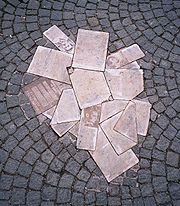
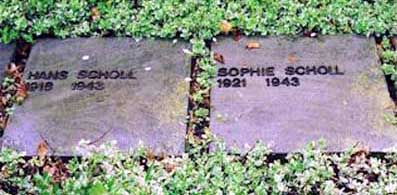
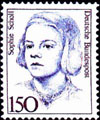
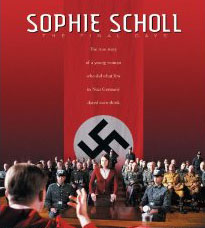 The
Legacy of the White Rose
The
Legacy of the White Rose